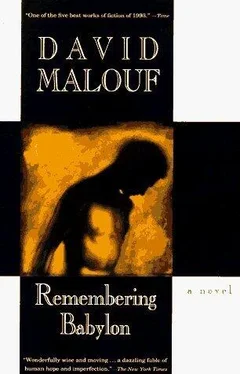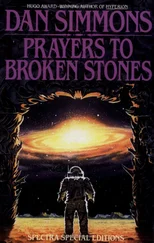In all their lives till they came here, they had never ventured, most of them, out of sight or earshot of a village steeple that, as they stooped to carry stooks and lean them one against the other, was always there when they looked up, breaking the horizon beyond the crest of a rise or across open fields.
Out here the very ground under their feet was strange. It had never been ploughed. You had to learn all over again how to deal with weather: drenching downpours when in moments all the topsoil you had exposed went liquid and all the dry little creek-beds in the vicinity ran wild; cyclones that could wrench whole trees up by their roots and send a shed too lightly anchored sailing clear through the air with all its corrugated iron sheets collapsing inward and slicing and singing in the wind. And all around, before and behind, worse than weather and the deepest night, natives, tribes of wandering myalls who, in their traipsing this way and that all over the map, were forever encroaching on boundaries that could be insisted on by daylight — a good shotgun saw to that — but in the dark hours, when you no longer stood there as a living marker with all the glow of the white man’s authority about you, reverted to being a creek-bed or ridge of granite like any other, and gave no indication that six hundred miles away, in the Lands Office in Brisbane, this bit of country had a name set against it on a numbered document, and a line drawn that was empowered with all the authority of the Law.
Most unnerving of all was the knowledge that, just three years back, the very patch of earth you were standing on had itself been on the other side of things, part of the unknown, and might still, for all your coming and going over it, and the sweat you had poured into its acre or two of ploughed earth, have the last of mystery upon it, in jungle brakes between paddocks and ferny places out of the sun. Good reason, that, for stripping it, as soon as you could manage, of every vestige of the native; for ringbarking and clearing and reducing it to what would make it, at last, just a bit like home.
It was from this standpoint that the little crowd of settlers, drawn together in such an unusual manner at this time of day, faced the black white man the children had brought in.
Little by little, as the afternoon wore on, an explanation came forth — but slowly. They were in no hurry to have things resolved and an occasion ended that offered so much in the way of the marvellous, and was, besides, such fun.
His name was Jimmy or Gemmy according to how you heard it (by the end of the day they had settled for Gemmy and were thus, in a familiar way, addressing him) and his other name was Fairley or Farrelly. Sixteen years before, when he was not much older than Lachlan Beattie, he had been cast overboard from a passing ship and had been living since in the scrub country to the north with blacks. All of which he made them understand partly with signs, partly with words that he dragged up at need, but in such a distorted form, as he hummed and hooted and shot spittle out of his mouth, and tried to get his tongue around them, that it was the signs their understanding leapt at. Guessing what he intended became a game, and at last, as they eased themselves into the unaccustomed jollity of it, a noisy carnival.
Occasionally, in the dead light of a paddock, all bandaged stumps and bone-white antlers, there would come a flash of colour, red or blue or yellow, and it would strike a man, but in a disconcerting way, as his heart lifted, that a country that was mostly devilish could also at times be playful; that there might be doors here, hidden as yet, into some lighter world. There was something of that too in the occasion, as, standing in a clump on one side with Jimmy, or Gemmy on the other, they scratched their pates, turned from one to the other, and he signed, mouthed, shook his head at their failure to catch on, till one of their number, quicker than the rest, or more foolhardy, piped up and said: ‘Well I don’t know. Maybe he’s up a ladder. Pickin’ cherries. Or hops — what about hops?’
The others scoffed. ‘Don’t be daft, Jack, that couldn’t be it. What a noodle! Hark at the ninny! Hops!’
Amendments were offered, new suggestions made, and at last, after a good deal of argument, they settled on something between the lot of them that made sense.
‘A ship! He was a sailor.’
‘Something’s got him scared.’
‘No, I’ve got it, a fever! He means he was sick.’
Some of the younger fellows, rowdy youths not easily subdued, were very solemn about it, as if the guessing game was a test. Eager to be right, they vied with one another, got hot under the collar, shouted, and when they were defeated, went mean at the mouth and sulked. Others thought it a fine chance to act the goat.
Children, whose only experience of such communal get-togethers was Sunday church and the gatherings organised by Mr Frazer, their minister, where their parents, constrained by collars, ties, bonnet strings, buttons, remained stiffly intimidated, were astonished now by so much levity. They could never have imagined their fathers, their mothers too, shouting and chiacking like this.
Meanwhile, the man himself was hauling at imaginary sails, puffing his cheeks out, rolling his eyes up and shaking his wrists in a passion to have them comprehend. He clenched his brow and made little hissing noises through his nostrils while he waited for them to come up with a suggestion, and when they looked at one another, drew their mouths down and remained dull, grew fierce with exasperation.
In his wish to make an impression on the grown-ups he had turned away from Lachlan; but seeing now that the boy was among the quickest of all at guessing what he meant, he fell back on what he felt was an affinity between them. He would, out of deference to the adults, make a sign in their direction, and when they failed to grasp it, turn to Lachlan; or someone in the crowd itself would. ‘What is it, lad? What’s he trying to say?’
The boy, seeing his power restored in a new form, was determined to make the most of it.
You see, the line of his mouth proclaimed, as once again the fellow laughed and paid tribute to his cleverness with a slap of the thigh, Ah told ye Ah was the wan! Or he would deliberately hold back and make them wait, screwing his face up, pretending to be stumped, so that, with a shout of triumph and a little knock of his knuckles against his skull at his own stupidity, he could the more dramatically come up with an answer. ‘Yer a clever little bugger, ain’t ye!’ one of the older fellows hissed in his ear.
But at last no more facts suggested themselves to the man. He looked about, uncertain; then, as a proof of what he claimed, tore away the cloth he wore round his middle and held it out to them. There were giggles and an embarrassed clearing of throats as one of the men, Ned Corcoran, took hold of the rag and in a gingerly way looked it over.
It was the remains of a jacket. Salt-stained and stiff with dirt, it had once been blue, maybe royal blue, and still had a hint of colour to it.
Ned Corcoran frowned. What was he expected to do with the thing? Holding it at arm’s length, he passed it to the next man. He too examined and passed it on. One of the women, offered the foul-smelling bundle, wrinkled her nose and turned away. Gemmy, his brow furrowed, had begun to skip about on one leg. Little whimpering sounds came from him.
‘He wants it back,’ one of the smaller children said dreamily out of her own experience, and looked about, suddenly shy at having spoken.
‘He does too. The bairn’s right. Give it ’im back.’
Jock McIvor, whose hands it had come to, passed the rag back, and the fellow grinned and hugged it to his chest but made no attempt to restore it to where it would do most good. This was too much for Jim Sweetman. ‘For God’s sake, man,’ he exploded, ‘cover yourself.’
Читать дальше












